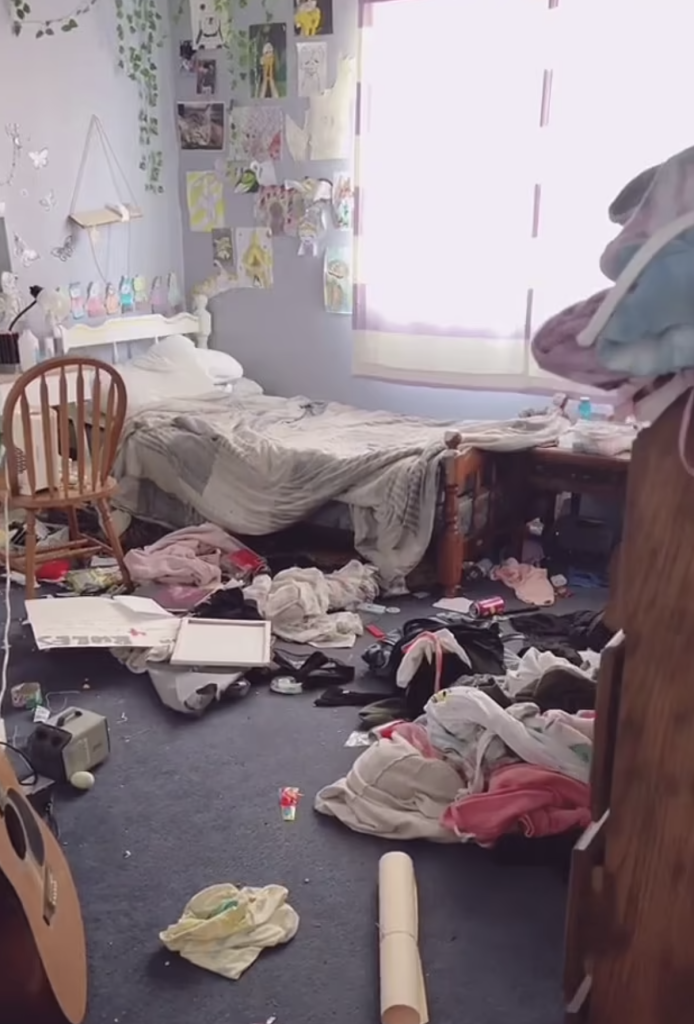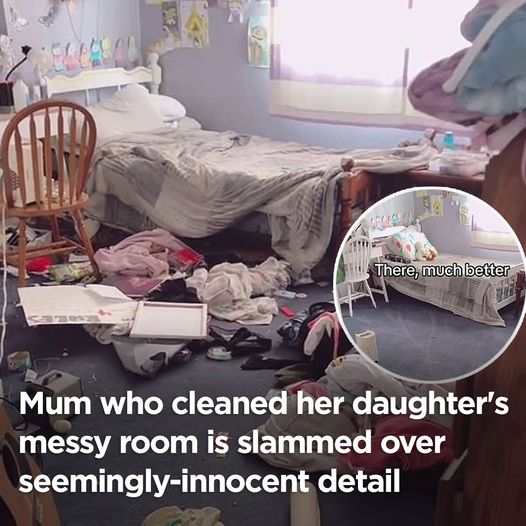Mom, Snowenne, runs a popular TikTok known as Snowenne Cleans, devoted to tips and tricks for cleaning your room and other areas of the house. Her organization skills are incredibly satisfying, and she’s known for her ability to tidy up the messiest of spaces, including her daughter’s room. However, people had mixed reactions after she posted it to her page.
Inspiration for Cleaning Your Room
With more than 180,000 TikTok followers, the mysterious masked mother of 2 has deemed herself a “cleaning motivator.” Describing her page as featuring “fun and entertaining cleaning videos”, she certainly has great ideas for helping people organize their homes. She posted before and after videos of the bedroom, once again showcasing her skills. She even added some touch-up paint to brighten the room as a surprise for when her daughter got back from a trip. The after the video was a stunning transformation, fit for a magazine cover.

An Array of Feedback
While many followers showed concern for her daughter’s mental health, others quickly pointed out how spoiled her daughter must be. “Seriously, is she okay? Is everything okay at school? I’ve seen a lot of bedrooms get like this with kids who are struggling with something,” One user explained. Meanwhile, others said things like, “Not in a million years would my mum let my bedroom get in that state in the first place.” And “This child is very spoiled. She should learn in time to keep her room clean, unless you still want to clean up after her at 18.”
One user pointed out that not cleaning up after yourself is inconsiderate. Stating, “I’ve had so much ‘dirty’ roommate drama. I hate it when parents don’t teach their children to clean up!” Meanwhile, another user was confused by the situation. She said, “I really don’t understand why you clean it. Neither how you let it go so far.”
Empathizing with the Girl
In contrast, others empathized, fully disclosing, “I would have loved and needed this help with my room as a teenager with undiagnosed ADHD and Autism. My room was always a mess.” And “your daughter’s definitely an artistic personality, I hope she is also ok mentally. I know the struggle …”
Snowenne Cleans, had no qualms about explaining the situation to those who didn’t understand. She responded with comments like, “She knows how, but she struggles with it. I only do it when it gets bad like this because she gets too overwhelmed by it.” “I will always be there for my kids no matter the age.” And “She was so tired from her trip and was so happy to know she could just relax.”


Inhibitors of Cleaning Your Room
All in all, this loving mom got a full array of reactions and responses. As evidenced by the number of people who shared their own experiences, she’s clearly not the first parent to have to face the difficulty of getting children to clean up their rooms. With that in mind, are there things a parent can do to help motivate kids to clean their room? Like this little girl, do disorders like anxiety, depression or autism play a role, or is it simply just negligence?
Cleaning Your Room Creates Serenity
According to Psychology Today’s Jane Timmons-Mitchell, “Teaching children to organize their possessions is a parenting skill; like many others, sometimes parents need to learn the skill themselves before they can aid their children.” She also explains that Japanese organization consultant, Marie Kondo, recommends letting go of the possessions that “do not spark joy.” In these instances, families have to work together to keep their homes clean. Alternatively, if children aren’t taught good habits like picking up after themselves, they may become reliant on others to do the work for them. Furthermore, they miss out on the satisfaction, pride, and responsibilities of picking up after themselves.
Conditions to Look Out For
Although most people forget what it was like growing up, childhood and adolescence aren’t without their own challenges. As such, sometimes depression or anxiety, as well as other mental conditions such as developmental delays, hoarding, or ADD and ADHD, can be major roadblocks in cleaning your room. In these instances, the most important thing a parent can do is to be attuned to their child’s needs. This means knowing the signs of teenage depression. It means understanding how their brains play a role in preventing them from focusing on the task at hand. Furthermore, it means being an ally, which occasionally might include helping them clean their room, just like this loving mom and TikTok user.
Tips to Encourage Kids
On the other hand, there are times when kids are just lazy or unmotivated. Luckily, there are a few solutions to encourage kids to clean their rooms.
Start Early.
From the very beginning, address good habits like ” I’m throwing away your empty formula container”. “Or We have to put your dirty onesie in the laundry hamper.” That way, kids start learning early on that these small tasks have to be done.
Cleaning Your Room
“Do as I say, not as I do” is an incredibly outdated cliche. We now understand that children learn best by modeling behavior. Therefore, if you want your kids to tidy their rooms, you have to be actively cleaning your room clean as well.
Be Realistic
Keeping your expectations realistic and aligned with what’s age appropriate for your children can help teach them good habits like cleaning up after themselves. For example, a toddler isn’t going to be able to scrub a tub. Nor should they, or their skin, be exposed to those harsh chemicals. However, they can help load spoons into the dishwasher.
Don’t Use Cleaning for Punishment
Children are much more likely to clean if they enjoy it. Dancing, singing, or telling stories while cleaning can help pass the time more quickly and keep kids on task. Note that if your child has ADHD or something similar, this tip may actually have an adverse effect.
Allow Them to Choose
By giving them options regarding which chores they’ll do, they’ll feel less resentful always having to do the same chores over and over, simultaneously being forced to do chores they hate.
It’s hard for most people to find the motivation to clean up. Kids are still learning to navigate life, and therefore need a little guidance for developing good hygiene and healthy habits.
